2022 NAEd/SPENCER DISSERTATION FELLOWS
Caitlin Ahearn, University of California, Los Angeles
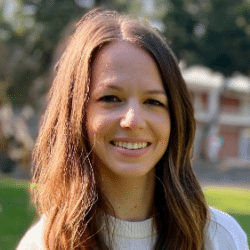
Caitlin Ahearn is a Ph.D. candidate in Sociology at the University of California, Los Angeles. Caitlin is also a student affiliate at the California Center for Population Research and has worked as a research fellow for the Los Angeles Education Research Institute for four years. She is broadly interested in inequalities in educational attainment and associated occupational and life course outcomes. Her research applies causal inference approaches to large-scale longitudinal survey data. Caitlin’s dissertation assesses the impact of enrollment in broad-access four-year institutions on key markers of adulthood, including educational attainment, economic insecurity, and family formation. Other ongoing research projects include estimating heterogeneity in the effects of college on voting (with Jennie Brand and Xiang Zhou), and examining changes over time in the racial composition of elite college enrollment. She has recently published research in the Sociology of Education on the interaction between educational and occupational expectations. Caitlin’s research has been supported by the UCLA Graduate Division and by the California Center for Population Research.
Examining the Early Adult Economic and Social Returns to Broad-Access Four-Year College Enrollment
Operating at the margin between community colleges and more selective colleges, broad-access four-year institutions have an important opportunity to offer a pathway to social mobility for students historically locked out of higher education. Still, relatively little is known about whether students who enroll in these colleges are placed on a similar path as those who enroll in more selective colleges, or how their life course trajectories differ from community college enrollees. To address these questions, my dissertation delineates the diverse consequences of broad-access four-year college enrollment, and how those vary across the student population. I apply a causal inference approach to the ELS and the NLSY97 data sets to examine three economic and social outcomes. First, I examine differences in bachelor’s degree returns to broad-access four-year college by socioeconomic status, high school achievement, and race. Second, I estimate the effects of broad-access four-year college enrollment on economic disadvantage during early adulthood, and assess differences by socioeconomic background to better understand social mobility processes. Finally, I study how college enrollment decisions relate to union formation and stability, and how those effects vary across gender. I further focus on how degree completion mediates the effects of differential enrollment on economic disadvantage and family formation. My dissertation contributes to theoretical and empirical understandings of the processes by which institutional stratification in higher education affects individuals’ outcomes. By highlighting when, for whom, and why college differences matter, this project will help inform decisions at the policy, institutional, and individual level.
Julio Alicea, University of California, Los Angeles
Julio Angel Alicea is a Ph.D. Candidate in Urban Schooling at the University of California, Los Angeles (UCLA) in the School of Education & Information Studies. Julio’s scholarship is deeply grounded in his lived experience as the son of working class Puerto Rican laborers near Philadelphia and as a former high school teacher at a Title I public school in Rhode Island. As a critical sociologist and ethnographer, his research focuses on the racial-spatial politics of urban schools and other local state organizations. At UCLA, Julio is a member of the Edward A. Bouchet Graduate Honor Society and the recipient of several fellowships and grants, including the Eugene V. Cota-Robles Fellowship, the Graduate Dean’s Scholar Award, and the Shirley Hune Inter-Racial Studies Award. His scholarship has been published in Sociology Compass, Urban Education, and the Handbook of Urban Education, among others.
In addition to his doctoral studies at UCLA, Julio is also a Master of Public Policy Candidate (concentration in social policy) at the UCLA Luskin School of Public Affairs. Prior to coming to UCLA, Julio earned a B.A. in Sociology & Anthropology from Swarthmore College, where he was a Mellon Mays Undergraduate Fellow, and a M.A.T. in Social Studies from Brown University, where he was a Woodrow Wilson-Rockefeller Brothers Fund (WW-RBF) Fellow. Outside of his research, Julio enjoys teaching and mentoring students, writing for the public, and traveling with his wife and soon-to-be-born son.
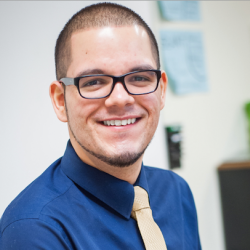
“From Every Shade of Brown and Back; That Includes Black”: A Critical Ethnographic Study of Racial-Spatial Politics and Pedagogies at an Urban School
In a matter of decades, South Central Los Angeles has transitioned from 80% Black to nearly 70% Latinx. This development is linked to many sociospatial factors, including shifting immigration patterns, political economic restructuring, and Black displacement. My research examines the relationship between such sociospatial forces and the organizational dynamics of one high school in the heart of the community. As a longitudinal ethnography, the project includes participant observation, in-depth interviews, historical analysis, and qualitative spatial methods. The study utilizes data from four consecutive school years to show how one school’s politics and pedagogies evolved over time as racial landscapes changed and new crises emerged to shift organizational priorities. It argues that self-described social justice schools serving exclusively students of color can and still do perpetuate racial stratification; this is most evident in the real tensions that exist between antiracism and the work needed to undo anti-Blackness.
Upon its completion, this dissertation will offer myriad contributions to the sociology of education, racial and ethnic studies, and urban studies. In the sociology of education, it offers insights into school-based mechanisms of stratification between racially minoritized groups, including via relational processes of opportunity hoarding and the decoupling of organizational values and practices. In racial and ethnic studies, it reveals the limits of coalitional racial politics before and after George Floyd and the ways in which those limitations shape diversity, equity, and inclusion work at the K-12 level. Lastly, in urban studies, it provides an expanded analysis of racial formation as a regionalized phenomenon.
Gladys Y. Aponte, City University of New York Graduate Center
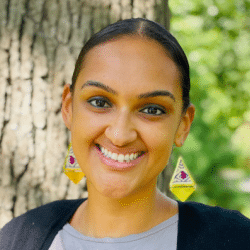
Gladys Yacely Aponte is a Ph.D. candidate in Urban Education at The Graduate Center, City University of New York. Her research focusses on examining and disrupting raciolinguistic ideologies in Spanish/English dual language bilingual programs. As a first-generation Dominican New Yorker, Gladys is particularly interested in interrogating the widespread raciolinguistic stigmatization of Dominicans – a Latinx group that is widely perceived as more Black than other Spanish-speaking Latinxs.
Prior to pursuing a doctoral degree, Gladys was a dual language bilingual teacher in New York City public schools. As a Research Assistant with CUNY- New York State Initiative on Emergent Bilinguals (NYSIEB) and an Induction Mentor at Columbia’s Teachers College, Gladys has continued to work closely with teachers of multilingual students to cultivate culturally/linguistically-sustaining classrooms. Her lens is also shaped by her work with pre-service teachers at CUNY’s City College and Bank Street College of Education, where she teaches and advises in the ESL and Bilingual teacher preparation programs. Gladys has created educational materials for The New York State Education Department’s Next Generation Learning Standards Bilingual Progressions. She was the recipient of the CUNY Dominican Studies Institute’s 2019 Research Grant.
Latinx Students & Raciolinguistic Ideologies in Dual Language Bilingual Classrooms
Dual language bilingual programs have become increasingly popular in school districts across the nation. While this model of bilingual education is meant to provide equitable and linguistically-sustaining schooling for emergent bilingual students, it is important to examine its pitfalls. In Spanish/English dual language classrooms, for example, uncritically teaching in a dominant, “standard” Spanish may reinforce inferior views of Latinxs Spanish speakers as students learn to exist in relation to hegemonic standards in both English and Spanish. This dissertation draws on the study of raciolinguistic ideologies— those which position the language practices of racialized groups as inherently deficient (Flores & Rosa, 2015), to examine how fourth grade Latinx students in a Spanish/English dual language bilingual public school navigate raciolinguistic ideologies about the Spanish language. In particular, this study looks at the ideologies that surround the language practices associated with Dominicans—a Latinx group that is widely perceived as more Black than other Spanish-speaking Latinxs, and a group that is the demographic majority in the school’s New York City neighborhood. This ethnographic case study analyzes classroom observations, student classwork, and interviews with focal students across three dual language bilingual classrooms. This study contributes to the academic conversations geared towards challenging deficit framings of Latinx students and towards improving the schooling experiences of racially and linguistically marginalized students.
Carlos Diego Arenas Pacheco, University of Notre Dame
Carlos Diego Arenas Pacheco is a Ph.D. candidate at the Medieval Institute, University of Notre Dame. Born and raised in Iztacalco, Mexico City and the town of San Francisco Shaxni by a working class family, he is proud of representing his Otomi, Nahua, and chilango roots beyond Mexico. His research focuses on the history of education and world literature in the early colonial Iberian world, from Mexico and Peru to the Philippines and Japan. With his comparative and multilingual research, he proposes a global account of the history of colonial education that inserts Amerindian students and writers within world history and literature. He is also interested in Indigenous language revitalization and the value of translating and producing world literature in Indigenous languages. In addition to his work as a Nahuatl language instructor and translator, he recently organized a public humanities event featuring Indigenous translators of Aesop’s Fables from across the Americas.
He holds a Licentiate in Philosophy from Universidad La Salle, a Masters in Humanities from Universidad Autónoma Metropolitana-Iztapalapa, and a Masters in Medieval Studies from the Medieval Institute, University of Notre Dame. In addition to the NAEd/Spencer Dissertation Fellowship, his work has been supported by the Institute for Scholarship in the Liberal Arts (University of Notre Dame), Notre Dame International, the Bibliographical Society of America, the John Carter Brown Library, and the Newberry Library. He published his first peer-reviewed article in the Journal of World Literature and has submitted two other articles for publication.
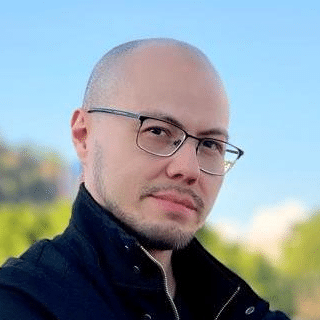
Global Students, Global Writers: Education and World Literature in the Early Colonial Iberian World (1520-1620)
Beginning in the early sixteenth century, numerous non-European boys and girls in the Americas and Asia were educated in boarding schools managed by Spanish and Portuguese missionaries. There, non-European children became global students by receiving an education in both European culture (the Latin alphabet, the book, Catholic doctrine) and elements of their own cultures, particularly their language. Often against the wishes of Europeans, global writers appropriated the alphabet and the book to pursue their own literary (and political) agendas. Drawing from archival and printed sources in over ten languages, from Latin to Nahuatl and Japanese, this dissertation studies the reception of European education and literature by non-Europeans in the Spanish colonies of New Spain, Peru, the Philippines, and the Portuguese settlements in Asia. Against traditional accounts of Iberian educational projects that favor the perspective of European missionaries, this dissertation argues for the active role of non-Europeans in the education of new generations and the creation of their own bodies of writing. Starting from the study of the embodied experiences of boys and girls in boarding schools, I proceed to examine the curricula at schools of higher education for non-European young men. I finish with a comparative study of translations of European literature by global writers and of the development of non-European individual authorship in the early seventeenth century. By comparing Amerindian intellectuals with other global students and global writers, this dissertation contributes to scholarship on Indigenous intellectuals and to current debates on Indigenous education in a globalized world.
Mariana Lima Becker, Boston College
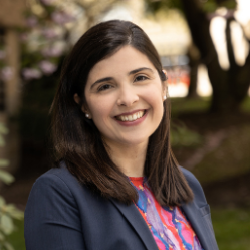
Mariana Lima Becker is a Ph.D. candidate in Curriculum & Instruction at the Lynch School of Education and Human Development at Boston College. Her research explores the intersection of bilingual education for language-minoritized students, im/migration, and literacy studies. Her dissertation examines the experiences of education and literacy practices of Brazilian immigrant children across their homes and classrooms in a dual language bilingual education program (Portuguese-English) in the U.S. state of Massachusetts. Grounded in a critical childhoods approach, her ethnographic inquiry centers elementary-aged Brazilian immigrant children, foregrounding their transnational experiences, perspectives, and narratives. Mariana has published in the Journal of Early Childhood Literacy, Childhood, Global Studies of Childhood, and the International Journal of Bilingual Education and Bilingualism. She has also received research grants from The International Research Foundation for English Language Education and the Center for Human Rights & International Justice at Boston College. Before starting her doctoral studies, Mariana was an English as a Foreign Language teacher at a middle school and in several language institutes in her hometown of Recife, in the Brazilian northeast. She is also a licensed English as a Second Language teacher in Massachusetts. Mariana received a B.A. in Letras from the Universidade Federal de Pernambuco (UFPE), an M.A. in Linguistics from UFPE, and an M.A. in Applied Linguistics from the University of Massachusetts – Boston.
(In)Equality, Interdependence, and Belonging: Brazilian Immigrant Children’s Experiences Across Home and a Dual Language Bilingual Education Program in the United States
Brazilian immigration to the United States has more than tripled since 2018, indicating the need for schools and educational research to develop appropriate responses to serve im/migrant students from lesser known cultural and linguistic backgrounds. This dissertation consists of an ethnographic study conducted over four years (2018-2022) centering the educational experiences and literacy practices of Brazilian im/migrant children in a Portuguese-English Dual Language Bilingual Education (DLBE) program at their elementary school and in their homes in Massachusetts. To that end, this study draws on a framework that combines the concepts of inequality, politicized funds of knowledge, and literacies based on Latinx communities’ cultural practices of interdependence. This study has been conducted in two phases. During phase one, I followed a cohort of 50 children, the majority of whom presented a recent Brazilian immigrant background, in their DLBE classrooms for three school years. I focused on how they experienced education as reflected in their classroom participation, attitudes toward schooling, and feelings of belonging or, conversely, alienation in their school and communities. In the second phase, I zero in on a group of Brazilian children and families to examine how they engaged in literacy practices and contributed to an ethos of mutuality in their homes. Findings bear the potential to inform curricula, instruction, and teacher preparation to serve im/migrant students and generate insights to (re)think educational models and programs for minoritized populations in the United States.
Takeria Blunt, Georgia Institute of Technology
Takeria (Keria) Blunt is a fourth-year doctoral candidate in the Digital Media program at Georgia Institute of Technology. As a graduate researcher in the Expressive Machinery Lab (EML) as well, Keria’s work explores a variety of educational technologies based in computer science education (CSE) efforts. Her research focuses on centering the voices of marginalized populations in her analysis and development of educational tools to broaden participation in the field of computing. Keria is interested in co-creating CSE learning experiences, software, and courses for computing departments at Historically Black Colleges and Universities (HBCUs), given their unique atmospheres, histories, and challenges. Her work prioritizes the intersectional experiences of Black women undergraduate students across a variety of computing majors. When Keria isn’t conducting her research, she serves as a visual arts apprentice for the Journal of Equity & Excellence in Education (EEE).
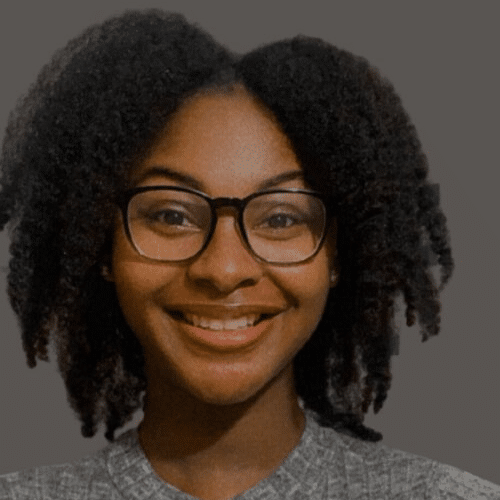
Supporting Sensemaking And Self-building In Black Women HBCU Computing Majors Through Design Based Research Extended Through Black Feminisms & Afrofuturist Speculative Design
Recent digital divide scholarship recognizes the limitations of traditional studies on access to computers and computer literacies and make the call for practitioners and researchers to prioritize research that embodies a sociocultural focus. These works examine the “digital identity divide”, relationships between computing and culture, and the design of viable learning spaces and pedagogies that center equity and social justice for marginalized students in STEM and particularly in computer science education (CSE). One such student group of concern in this sociocultural expansion is Black women STEM students, who frequently wrestle with an “outsider-within” status in all levels of academia and industry. This outsider status often renders Black women invisible, excluded, and/or tokenized in some spaces. Present literature scarcely reveals the visions that Black women CS students have of future technologies and techno-futures, which I argue contributes to issues of invisibility and ostracization in the computing field. This work aims to address these gaps by blending emerging design-based research (DBR) approaches with Black feminist epistemology and Afrofuturist speculative design to develop and test CS learning interventions that: a) support computing identity development through design and invoking the “sociological imagination” in Black women CS students; b) center these students as producers of knowledge and technological artifacts and futures; and c) generate nuanced data about the lived experiences of Black women CS majors, particularly those learning computing at Historically Black Colleges and Universities (HBCUs). This endeavor takes part in reimagining what CSE looks like for students.
James Bridgeforth, University of Southern California
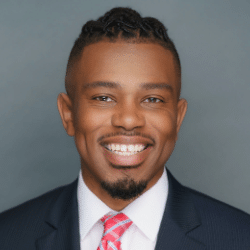
James Bridgeforth is a Ph.D. candidate in the Rossier School of Education at the University of Southern California. He is also a research associate at the USC Race and Equity Center and the USC Rossier Center on Education Policy, Equity, and Governance. His research agenda broadly engages in critical analyses of education policies and practices in K-12 schools. In particular, his dissertation project examines how K-12 school boards navigate the policy development process when addressing issues of race and racism within their districts. He specifically focuses on how those policies are conceptualized, which stakeholders are involved in their development, and the depths to which the proposed solutions are aligned with the expressed needs and desires of the communities of color that the educational leaders serve. James began his professional experience in education as a college admissions officer and later transitioned to a career in K-12 education as an elementary school teacher. He holds an M.Ed. in Educational Administration and Policy from the University of Georgia and a B.A. in Political Science and Sociology from Georgia College & State University. His scholarship has been published by the Journal of School Leadership, The Rural Educator, and the Association for Supervision and Curriculum Development, in addition to media outlets such as Education Week, The Hechinger Report, and The Washington Post. Ultimately, his goal as a researcher is to use his work to disrupt and dismantle oppressive policies and practices, while working with communities of color to envision new and more racially just possibilities.
Policies, Procedures, and Performance: A Critical Examination of K-12 School Boards and the Enactment of Racial Crisis Leadership
Recent recordings of contentious school board meetings demonstrate the growing frequency with which K-12 school board members publicly navigate racial crises. Examples of such crises shown in the media include teachers being photographed in blackface, racist social media posts, and intense debates regarding race and racism in curricula. Yet how many board members have been formally trained to lead a district through a racial crisis? This organizational disconnect is a critical area for research as board members are directly responsible for developing district policies in response to incidents of racism in schools. Guided by insights from the theory of the political spectacle along with critical theories of race and racism, my dissertation study employs elicitation interviews with school board members, focus groups with racially minoritized community members, and school board meeting records to better understand how school board members conceptualize and enact effective racial crisis leadership. This work also interrogates how board members’ conceptions of solutions compare with those of communities of color in order to identify potential inconsistencies between what educational leaders believe is effective racial crisis leadership and what the communities most at risk of being harmed by racial crises would identify as effective racial crisis leadership. By better understanding how both K-12 school board members and racially minoritized communities conceptualize effective solutions to racial crises, I hope to develop inclusive approaches for racial crisis leadership that can ensure that the needs of the communities most often harmed by racial crises are centered in the policy development process.
Daniela Castellanos Reyes, Purdue University
Daniela (Ela) Castellanos-Reyes is a Ph.D. Candidate in Learning Design and Technology at Purdue University. Proudly raised by a single mother and a grandmother who finished school via correspondence, Ela approaches her research with the belief that online and distance learning improve women’s lives. She is an educational researcher within the fields of instructional design and learning analytics. Her research focuses on supporting online learners’ social presence through network analysis. Specifically, Ela is interested in how peer-influence shapes learning communities in online learning environments. In her dissertation, Ela examines how online learners’ behaviors evolve over time influencing members’ ability to feel connected in a community. Ela has also worked on the role of Latina/o/x in instructional design, supporting instructors’ transition to online teaching, and visualizing learners’ interactions using process data. Her work has been published in Computers in Human Behavior, the Journal of Computing in Higher Education, and TechTrends. Ela’s work has been supported by the International Peace Scholarship awarded by Philanthropic Educational Organization (P.E.O.) and the Frank DeBruicker Graduate Award in Educational Technology. Prior to her doctoral studies, Ela earned her B.A. in English Philology and English Education from the Universidad Nacional de Colombia where she taught English as a foreign language, and a master’s degree in Learning Design and Technology at Purdue University. Outside research, Ela enjoys attending church, re-reading Harry Potter, and dancing in the kitchen with her husband.
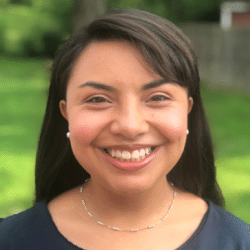
The Spread of Social Presence: Longitudinal Network Analysis Modeling of Students’ Peer Influence in Online Learning
Social presence, the ability to perceive others and project yourself in an online environment as real, positively influences online students’ motivation, satisfaction, retention, and learning outcomes in online learning. Despite being crucial for successful online learning experiences, little work has thoroughly examined the evolution of social presence over time and students’ social presence influence on peers’ interactions. In other words, if social presence can be learned by interacting with others. My dissertation will elucidate this gap by answering the overarching question: how do online students’ social presence evolution over time shape their online learning behaviors? I posit that researching online learning communities without considering the interdependence among learners may provide a restrictive perspective. Therefore, I will use network analysis to reflect the dependence among learners in online collaborative learning communities. Through the study of panel network data of online graduate students’ interactions and self-reported levels of social presence, I will investigate how learners’ social presence spreads in an online network of students over two consecutive courses using a stochastic actor-oriented model. My dissertation will show the first longitudinal evidence of social presence contagion behavior in online learning. The findings of my dissertation will improve educational practice by identifying behaviors that harm online social presence and providing specific actions for online instructors and instructional designers to promote social presence in online learning. My three-article dissertation includes two additional studies that explore social presence through clickstream interaction and identify social presence patterns that support knowledge construction in online learning.
Carolina Concha-Arriagada, Georgetown University
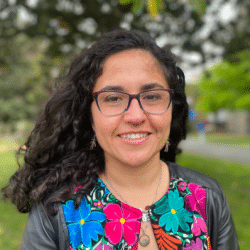
Carolina Concha-Arriagada is a Ph.D. candidate in Economics at Georgetown University. Her research focuses on the economics of education and labor economics. She is interested in human capital investments, with a particular emphasis on the relationship between access to opportunities, inequality, and mobility in the context of low- and middle-income countries. Her work combines economic theory, administrative data, and quasi-experimental research designs to analyze educational policies and their effects on families’ pre-college decisions. In her dissertation, Carolina explores the consequences of a large-scale educational policy in the Chilean centralized college admission system and its effects on income segregation and sorting at the high school level. In other works, she studies the value of elite public schools, high achieving peers, and the intersection between education and political economy. Carolina has taught a wide range of courses in economics at Georgetown, ILADES – Alberto Hurtado, and Universidad de Santiago de Chile. Before beginning her graduate studies, Carolina earned a B.A. in Economics from Universidad de Santiago de Chile and an M.A. in Economics from ILADES in Universidad Alberto Hurtado.
College Admission Policies and Students’ High School Choice: Evidence from Chile
Increasing opportunities for students from historically disadvantaged populations and communities have been the focus of many different policies around the world. Yet, little is known about how these policy shape students’ high school choices. In this paper, I examine whether a policy in Chile that mandated all institutions using the centralized system to incorporate a student’s high school-specific criterion affected students’ ninth-grade school choice. I exploit the adoption of the policy and the local school market structure to estimate the effects of the college admission criteria on the quality of the school students attend. Preliminary estimation indicates that students in local markets with high scope for gains are two percentage points less likely to attend a high-quality public school. Finally, I follow Otero et al. (2022) and estimate a joint school choice and outcomes model to study the effects of different policy changes in the college admission process.
Jorge Cuartas, Harvard University
Jorge Cuartas is a Colombian Ph.D. candidate in Education (Human Development, Learning and Teaching) at the Harvard Graduate School of Education and co-director of the NGO Apapacho. His research focuses on early childhood development and parenting in global contexts, the effects of corporal punishment and other forms of violence on children’s neural, cognitive, and socioemotional development, and the development and evaluation of early childhood and violence prevention programs and policies. Jorge’s research has been published in The Lancet Child & Adolescent Health, Child Development, and Developmental Psychology, among other journals.
Prior to his doctoral studies, Jorge worked as a researcher at Universidad de los Andes in Bogotá, Colombia. Jorge holds a Bachelor’s degree in Economics from Universidad Jorge Tadeo Lozano, a Masters’ degree in Economics from Universidad de los Andes, and a Master’s in Human Development & Psychology from Harvard University.
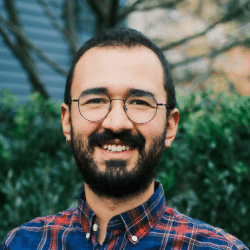
Corporal Punishment and Child Development and Learning in Low- and- Middle- Income Countries
Corporal punishment remains widespread in homes and schools worldwide, constituting a major threat to children’s developmental and educational trajectories. Whether corporal punishment is detrimental across cultures and countries is still controversial in policy, practice, and research, primarily due to disputes around the internal and external validity of prior studies. Specifically, most research has relied on cross-sectional designs, conventional covariate adjustment, and samples from high-income countries. Furthermore, there are few low-cost, scalable, evidence-based interventions to prevent corporal punishment in low- and- middle-income countries (LMICs), further intensifying the vast underrepresentation of these populations in the field.
The proposed dissertation comprises three integrated studies that will respond to these controversies and produce a global good to support the prevention of corporal punishment in LMICs. Paper 1 will meta-analyze existing studies on the links between corporal punishment in the home and schools and children’s developmental and educational outcomes in LMICs, assessing heterogeneity across countries/settings and due to child, context, and study characteristics. Paper 2 will strengthen evidence regarding the causal links between corporal punishment and young children’s school readiness in LMICs, leveraging data from five longitudinal studies and following best-practice recommendations for mitigating selection bias in observational research. Finally, Paper 3 will present the design, pilot, and curriculum/materials for an open-access, flexible, scalable universal violence prevention program targeted toward Colombia. Collectively, these studies will inform future research, legislation, policy, and practice aimed at protecting children from all forms of violence – including corporal punishment – so that children can develop, learn, and thrive globally.
Zaynab Gates, University of California, San Diego
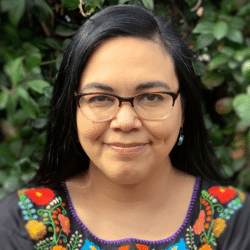
Zaynab Gates is a doctoral candidate in the Transforming Education in a Diverse Society, Education Ph.D. program at University of California, San Diego. Her research centers on teacher education in literacy instruction, intercultural bilingual education, Indigenous teachers, and public education policy. Her work is informed by working as a classroom teacher and university instructor in Chile, a research advisor in teacher professional development in Bolivia, and an author of literacy educational materials for students and teachers in Ecuador. As a teacher educator she has strived to address a two-fold purpose in education, namely, to develop our individual capabilities and to mobilize those capabilities to contribute building a more just, united, and peaceful society. As a member of the Wichí people of Argentina, she is drawn to explore and learn about the role of Indigenous peoples in radically re-imagining our collective future. In the US, she has worked in two research-to-practice partnerships between UCSD and local school districts using design-based research, more recently, exploring how secondary science teachers learn about dialogue with scaffolded noticing and reflection mediated by technology to engage with their own classroom data. Zaynab holds a B.A. in Education from Educares University in Chile and a M.A. in Social Sciences from FLACSO in Ecuador.
Writing Our Futures: Cultivating Biliteracy Practices with and by Pre-Service Indigenous Teachers
Recent studies have projected that by the end of this century between half and up to 95% of the linguistic diversity in the world will disappear. In the last four decades, intercultural bilingual education policies aimed at protecting Indigenous children’s right to learn in their mother tongue have been introduced in Latin American, a region home to more than five hundred Indigenous languages. Yet, little is known about how to meaningfully teach biliteracy competencies that simultaneously fulfill the goals of Indigenous cultural preservation and strategic economic and political participation in national society. Centering the voices of Indigenous teacher candidates and drawing from the continua of biliteracy framework, I propose to use design-based research (DBR) to co-design and iterate professional learning courses for fostering biliteracy practices in preservice teacher education. My research will be situated in language courses at teaching institutions in Chaco, Northern Argentina. This locale is a critical site for understanding language revitalization as the province has been leading efforts in the country to serve Indigenous peoples. This DBR will include interviews with teacher educators and Indigenous teacher candidates, classroom observation, and assessment of biliteracy competencies. Research questions will explore (a) teacher educators’ enactment of biliteracy practices, (b) Indigenous teacher candidates’ development of biliteracy competencies, (c) the relationship between biliteracy teaching and learning, and (d) teacher educators reflection process in literacy teaching for bilingual Indigenous preservice teachers. This study has implications for theorizing about Indigenous languages teaching and learning, preservation of linguistic diversity, and teacher education in multilingual contexts.
Paola Andrea Guerrero-Rosada, University of Michigan
Paola Guerrero-Rosada is a Ph.D. candidate in the Combined Program in Education and Psychology at the University of Michigan. Her research focuses on the classroom and center features that better support children’s development. She is interested on developing strategies to increase equitable access to high-quality early education settings, leveraging observational, geo-spatial, and administrative data. To that end, she has collaborated with a long-standing Research Practice Partnerships between Boston Public Schools, the University of Michigan, Harvard Graduate School of Education, and MDRC examining factors that promote children’s gains from preschool to third grade, and studying the implementation of the Boston Universal Prekindergarten Program.
Prior to her doctoral studies, Paola collaborated in large-scale evaluations of professional development programs for early education in Colombia, and led undergraduate programs for pre-service teachers at the School of Education at Universidad de Los Andes (Colombia). Paola received a B.A. in psychology from Universidad del Valle (Colombia), a M.Sc. in psychology from the Universidad de Los Andes, and from the University of Michigan. She is a 2018 APPAM Equity and Diversity Fellow, and a 2022 Rackham Predoctoral Fellow.
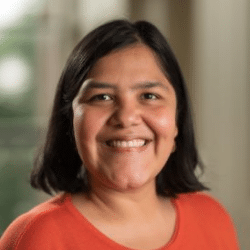
Identifying Actionable Classroom and Program Features for Quality Improvement and Expansion in a Large-Scale Prekindergarten Program
My dissertation aims to provide actionable evidence on three related pressing questions for the early education field: what instructional features of preschool classrooms predict children’s academic gains; whether instructional alignment from prekindergarten to first grade contributes to sustaining children’s academic gains; and how to optimize the selection of centers participating in universal prekindergarten programs. For my first aim, I compare the measurement properties of two instructional quality observational instruments: the Narrative Record (Farran et al., 2015) and the Individualizing Student Instruction (Connor et al., 2009) systems. For my second aim, I estimate multi-level linear regression models to identify the contribution of instructional alignment to children’s gains in language (Dunn & Dunn, 2007), literacy (Good III et al., 2001), and math (Clements et al., 2008; Woodcock et al., 2001, 2005). Finally, for my third aim, I describe statistical and geo-spatial differences between centers that self-select to participate in the Boston Universal Prekindergarten (UPK) program and other centers in the Boston area, using administrative data from their licensing, quality rating and improvement system, and accreditation status. Then, for the sub-sample of centers participating in the Boston UPK program, I describe what center characteristics are associated with their engagement with quality improvement supports during their first two years in the program. My results have the potential to inform quality measurement and professional development in early education classrooms and effective recruitment strategies for universal prekindergarten programs.
Molly Hamm-Rodriguez, University of Colorado
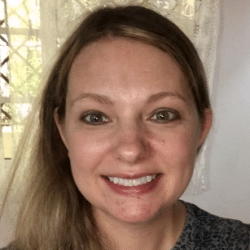
Molly Hamm-Rodríguez is a Ph.D. candidate in Equity, Bilingualism, and Biliteracy at the University of Colorado Boulder. Molly’s dissertation situates school-to-work transitions within longer transnational histories of educational policy and labor to complicate widely held beliefs about the relationships between language, literacy, and employment. By examining the talk and everyday negotiations of youth within a Caribbean tourism economy, this study reveals how certain labor markets constrain social futures while illuminating the alternative worlds that youth imagine and build. Her ethnographic research in the Dominican Republic was funded by Fulbright-Hays and Wenner-Gren.
As a graduate student at CU Boulder, Molly has taught undergraduate and master’s level courses for pre- and in-service teachers on multilingual language development and bilingual education. She has worked as a research assistant at bilingual elementary schools in Colorado through Literacy Squared and a Spencer-funded bilingual writing project. She has also supported school districts transforming teaching and learning for emergent bilinguals, including as a research assistant for an OELA National Professional Development grant and other projects with the BUENO Center for Multicultural Education. She has co-authored empirical and practitioner-oriented articles in Applied Linguistics; archipelagos: a journal of Caribbean digital praxis; CENTRO: Journal for the Center of Puerto Rican Studies; Language Arts; Learning, Culture, and Social Interaction; TESOL Quarterly; and The Reading Teacher.
Molly received an M.A. in International Educational Development from Teachers College, Columbia University and a B.A. in English and B.S. in Secondary Education from Kansas State University. She is a proud mom to her son, Jordy.
Re-Storying “Paradise”: Language, Imperial Formations of Tourism, and Youth Futures in the Dominican Republic
Globally, scholars and education practitioners focusing on school-to-work transitions and college and career readiness seek to align education systems—including skills and competency development frameworks—with local labor markets. However, critiques of these education models are frequently limited to neoliberalism and privatization, operating within assumptions of a bounded nation-state and insufficiently grappling with the transnational historical precedents of raced, classed, gendered, linguistic, geopolitical, and spatial stratification. This study brings racial capitalism and imperialism to the forefront of critiques about college and career readiness models while engaging youth participatory action research to disrupt these forces. Using a raciolinguistic perspective (Rosa & Flores, 2020), this project explores how youth language and literacy practices become the target for intervention and how youth re-story these framings. I build on a decade of professional and personal experience in the Dominican Republic to conduct 12 months of research with Dominican and Haitian youth using ethnographic, linguistic, and participatory action research methods. Taking place in the province of Puerto Plata, a major tourism hub, this study aims to disrupt the sociotechnical imaginaries (Jasanoff & Kim, 2015) that frame youth as deficient and instead reveal how youth prefigure alternative worlds and re-story the utopian dreams of a Caribbean “paradise” whose benefits are inequitably distributed. In particular, the study focuses on how youth build and develop a language of solidarity (Martinez, 2017) across difference to draw from and expand their multilingual and stylistic linguistic practices as they critique and contest shared struggles for survival in the Caribbean (Roland, 2011).
Jacqueline Ho, Cornell University
Jacqueline Ho is a Ph.D. candidate in Sociology at Cornell University. Beginning with the premise that how we evaluate “merit” can both generate and legitimate inequalities, her work examines the processes through which such evaluative practices are sustained or challenged. She is especially interested in practices of evaluation in the education system, given their major role in shaping inequality in modern meritocracies. Her dissertation examines how parents evaluate schools in Singapore, where there have been active policy efforts to broaden measures of student and school success beyond academic grades. These efforts echo attempts in other educational settings to adopt more “holistic” practices of evaluation in the name of equity. They offer an opportunity to study how people cope with the removal of rankings and quantitative metrics, and with their implications for inequality.
Jacqueline’s other projects examine why disadvantaged Singaporean youth may paradoxically believe that their society is meritocratic, and how actors on a college campus challenged or justified the morality of grading during the COVID-19 pandemic. She is drawn to cultural approaches to understanding how people make meaning of their social worlds, and interviewing as a method for excavating such meanings and how they shape action. Before graduate school, Jacqueline worked in environmental policy. Her experience of watching economists price nature led her to her current interest in how value is socially constructed, legitimated, and contested.
Jacqueline is a native of Singapore, which means she loves cooking, and a resident of Ithaca, which means she loves spending time in nature.
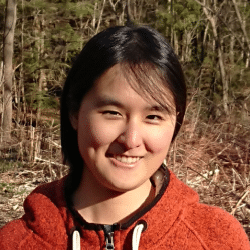
Can Every School Be a Good School? Unranking and Its Implications for School Status
In many education systems, families compete for admission to good schools. Well-resourced families invariably have the upper hand, which contributes to segregation and inequality. Proposed solutions tend to focus on equalizing access to good schools. Less commonly studied is whether it may be possible to reduce the competition in the first place, by changing the definition of what a “good” school is. If we broadened our measure of “goodness” beyond academic excellence, would families come to see more schools as good, thus flattening the school status hierarchy? This is the logic behind policy efforts that reduce the focus on academic metrics in favour of holistic approaches to evaluating students and schools. Yet we lack an evidence base for this logic, as work on school choice tends to treat perceptions of school quality as static, rather than investigating how they may evolve. To fill this gap, I examine the case of a decade-long “unranking” effort by the Singaporean government, which attempts to shift parents’ attention from academic to holistic aspects of school quality so they may see that every school is “good.” Drawing on policy debates, 13 years of school application data, and 50 interviews with parents, my dissertation will offer a theoretical understanding of what drives unranking, as well as empirical evidence on whether and how an expanded definition of school quality can moderate competition for schools.
Tyler Hook, University of Wisconsin-Madison
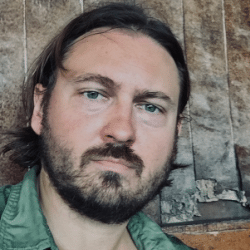
Tyler Hook is a joint doctoral student in Educational Policy Studies (concentration in Comparative and International Education) and Cultural Anthropology. His research examines the intersections of race/racism, capitalism, and educational development. He holds a B.A in History, Political Science, and Religion from Hope College, an MSc in Africa and International Development from the University of Edinburgh, and an M.A. in International Educational Development from the University of Pennsylvania. His research has been supported by a Wenner-Gren Dissertation Fieldwork Grant, a Social Science Research Council International Dissertation Research Fellowship, and a Fulbright-Hays DDRA. Prior to UW, Tyler worked as a teacher in the United States, Burundi, Thailand, and Japan, and as a teacher trainer with the Peace Corps in Malawi.
Corporatized Education: Reshaping Schooling and Educational Governance in Liberia
My dissertation examines corporatized educational reform and schooling through the Liberian Educational Advancement Program (LEAP). This partnership between the Ministry of Education, social impact investors, and largely for-profit corporate school chains attempts to align social and educational policy and development in Liberia with the “invisible heart of the market” through increased surveillance, financialization, and corporate management. My dissertation explores how these processes of corporatization, which typically follow moments of “crisis,” have transformed educational landscapes, creating new forms of governance and development that potentially reproduce racialized systems of inequality. My 16-month multi-sited ethnographic study focuses on how new configurations of power, governance, profit, and management within LEAP’s corporatized model of educational development materialized and are experienced by teachers, administrators, and families on the ground. As corporations increasingly become key actors in educational reform and schooling, moving into roles previously held by the state, merging educational development with profit, and attempting to align and narrow educational policy and practice with supposedly value-neutral and “post-racial” technologies, my dissertation attempts to show what kinds of governable spaces, subjects, and forms/opportunities of resistance are produced.
Zainab Hosseini, Stanford University
Zainab Hosseini is a Ph.D. candidate in Developmental and Psychological Sciences at the Stanford Graduate School of Education. Her work is concerned with addressing the deleterious consequences of exposure to adverse life events when refugee adolescents are forcibly displaced. She focuses on using access to education in emergency settings such as armed conflicts to facilitate psychosocial support services for adolescents. Rooted in community-based participatory research, Zainab’s work consistently engages the power and wisdom of refugee communities to co-develop culturally responsive and contextually relevant programs supporting refugee adolescents’ social and emotional development. She has built community partnerships with multiple international NGOs in Iran, Lebanon, Greece, and Mexico to facilitate research-practice projects that can meaningfully address refugees’ priorities.
Zainab’s research at Stanford has also included mixed-methods studies of ethnic/racial identity development and psychological well-being among Native American adolescents. She is an MA candidate at the Stanford Department of Psychology studying the cultural sensitivity of popular social emotional learning programs for global populations. She leads the Global Mental Health team at the Muslim Mental Health and Islamic Psychology Lab where she explores cultural concepts of distress among Afghan refugee adolescents in the US.
Zainab completed her Ed.M. at Harvard University where she took part in a collaboration with the United Nations High Commissioner for Refugees to evaluate psychosocial and educational services for refugees in Iran. She subsequently earned an MSW from the University of Michigan. Zainab completed a post-MSW fellowship at Boston Children’s Hospital, serving as a psychotherapist in the Division of Adolescent Medicine.
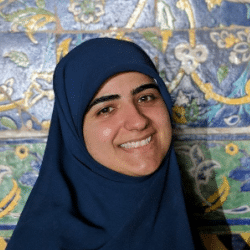
Evaluating a Culturally Responsive Social Emotional Learning Intervention for Refugee Adolescents in Tijuana, Mexico
The United Nations Children’s Relief Fund (UNICEF) estimates that in 2020, almost half of the global refugee population were children, and 1 in 3 children living outside their countries of birth were considered refugees. These children face an intertwined set of adversities throughout multiple stages of their displacement that places them at a high risk for experiencing disruptions to their social, emotional, and cognitive development. There is a burgeoning interest among the humanitarian aid community to harness the power of social emotional learning (SEL) in ameliorating some of these consequences. However, many extant programs have been designed using imperialist mindsets that conceptualize refugees as inept at guiding their own growth. Further, the use of frameworks originally designed for use within stable western nations in emergency contexts has led to ample cultural and contextual incoherence.
Situated in Tijuana, Mexico, this dissertation project has engaged refugee caregivers and shelter directors in the co-creation of a brief SEL program titled VAMOS! to support refugee adolescents’ social development during active displacement. In collaboration with La Universidad Autónoma de Baja California and Save the Children, Mexico, this culturally responsive program is being implemented across multiple shelters serving refugees and Internally Displaced Populations (IDPs). Through a longitudinal blocked randomized experimental design, participants at each shelter are randomized into receiving either VAMOS! or a popular SEL program designed by a major international NGO. This project explores whether brief SEL programs can support refugee adolescents’ social outcomes and whether culturally responsive programs are more successful at doing so.
Corinne Kentor, Teachers College, Columbia University
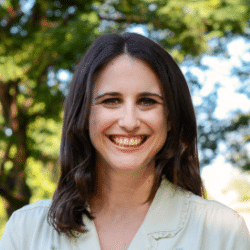
Corinne Kentor is a Ph.D. candidate in Anthropology & Education at Teachers College, Columbia University. Her research focuses on the intersection of immigration and higher education policy, investigating how legal frameworks shape the lives of mixed-status families in the United States. As an ethnographer and educator, Corinne is deeply committed to working in collaboration with families to instigate reform. Her research asks scholars and practitioners to expand their thinking about who is affected by the choices made on college campuses and in high school counseling offices, showing how entire communities are affected by the policies and priorities that shape the landscape of higher education in the present day.
Corinne graduated with honors from Yale University, where she earned a B.A. in English and a certificate in Education Studies. In 2018, she was named a National Science Foundation Graduate Research Fellow. That same year, she joined the research and evaluation staff at the City University of New York Office of Research, Evaluation & Program Support. At CUNY, Corinne researches students’ transitions from high school to college and from college to the workforce. She also supports research and evaluation efforts for We Speak We LEAD, a program that provides language learning and workforce development for immigrant women in the New York area. Corinne is a dedicated, community-driven activist working to advance the right to family, mobility, and education in the places she calls home.
For Me, Us, and Them: Immigrant Families Pursuing Higher Education in Southern California
Educational opportunity is often presented as a central motivation for migration. Despite the challenges they face, immigrant families express high future ambitions, as evidenced by the increasing number of immigrant and first generation students enrolling in higher education. Research has recently begun to explore these students’ experiences in college; however, less is known about how immigrant families collectively navigate the high-school-to-postsecondary transition. This dissertation draws on two years of ethnographic research conducted in southern California to investigate how family migration shapes academic and professional trajectories after high school, treating the pursuit of higher learning as a shared endeavor. In my research, I focus on understanding how migration experiences (whether their own or those of family members) impact students’ goals and transition experiences; in addition, I investigate how family members get involved in one another’s educational pursuits while responding to the constraints posed by the United States’ punitive immigration policies. Though there is substantial research documenting immigrant families’ experiences in K-12 schools, most studies of higher education focus on students as individual learners. By prioritizing the experiences of extended kin-networks, I counter this individualistic focus, showing how academic outcomes for college-goers are impacted not only by the policies that affect their access to education, but also by those that shape the experiences of their loved ones, including caregivers and younger relatives. My research thus shows how families collectively engage in the pursuit of educational opportunity across national and institutional borders.
Andrew Koepp, University of Texas
Andrew is a doctoral candidate in Human Development and Family Sciences at the University of Texas at Austin. His work examines children’s self-regulation: new ways to measure it, how it matters for later development, and how adults can help children develop it. He is especially interested in how young children learn to manage their attention and behavior in educational settings. In his dissertation, Andrew examines how researchers can use wearable technology to understand children’s learning-related behaviors in the classroom setting. He collected data for his dissertation with support from a Doctoral Dissertation Research Improvement Award from the National Science Foundation. In his other work, Andrew examines how school and family contexts shape children’s development, both in the United States and in Brazil. Andrew’s work appears in Child Development and Development Science. He holds degrees in Human Development from Vanderbilt University (B.S.), Harvard University (Ed.M.), and the University of Texas at Austin (M.A.).
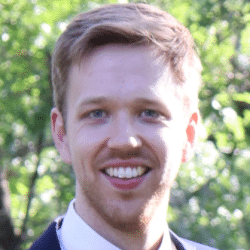
Exploring Variability in Young Children’s Behavioral Regulation: New Evidence from Wearable Devices to Inform Educational Practice
In order to learn, children must be able to focus their attention and inhibit impulsive behavior. Individual children display a range of these skills in the preschool classroom, but when and why a child’s regulation varies is poorly understood despite its importance to learning and classroom management. To address this gap, Andrew will develop and apply a method for assessing children’s behavioral regulation across classroom activities and across school days. He will extract movement-based indicators of children’s behavioral regulation from wearable accelerometers and use machine learning methods to identify and refine additional indicators. He will validate these new indicators against measures of cognitive and behavioral regulation as well as early academic skills and problem behaviors. He will then examine variability in children’s regulation using repeated observations of children’s behavioral regulation across classroom activities and across school days. Finally, he will begin to examine what factors predict variability in children’s behavioral regulation. This knowledge will help educators understand how to support young children’s behavioral regulation for classroom management and individual learning.
Sinja Küppers, Duke University
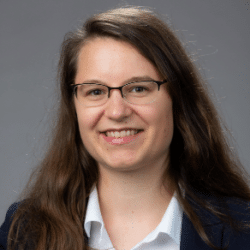
Sinja Küppers is a fifth-year Ph.D. Candidate in Classical Studies at Duke University. Her research focuses on the social history of higher education in the late Roman Empire. Sinja is particularly interested in educational biographies and the impact of class on education. In spring 2022, Sinja taught a special topics course on Roman Education at Duke and discussed the relationship of privilege and students in need with the fellows at the Kenan Institute of Ethics. After reflecting on what brings purpose and meaning to college education as a Teaching Purpose Fellow, Sinja is supporting the Curriculum Development Committee in the summer 2022 with revamping the Trinity College of Arts & Sciences curriculum. Over the course of her PhD, she developed multiple digital projects for research and instruction, such as mapping the movement of Greek intellectuals around the ancient Mediterranean. Prior to her Ph.D. at Duke, Sinja earned a M.St. in Greek and Latin Languages and Literature from the University of Oxford and a B.A. in Ancient Languages and Cultures from the University of Cologne.
Marginalized Voices and Educational Pathways: A New Perspective on Higher Education in Late Antiquity
The scholarship on higher education in the later Roman Empire has focused on the social and intellectual influence of key figures, such as Augustine of Hippo. Little attention has been paid to what their educational pathway looked like before reaching the peak of their career and how their educational background influenced them as teachers and social stakeholders. This dissertation broadens the social history of education to nontraditional career paths and diverse socioeconomic conditions within the Roman intellectual elite while showing the boundaries of Roman higher education. The aim of this dissertation is a more comprehensive understanding of the social fabric of later Roman education and the diverse perspectives represented in higher education and society. Specifically, my literary analysis of intellectuals’ biographies and letters sheds light on marginalized voices in higher education, using Bourdieu’s sociological distinction of capital, Lin’s social network theory and Allport’s concept of prejudice. The ancient literature that informs about socioeconomic conditions and educational pathways are contextualized with reference to scholarship on Roman intellectual cultures, ancient demographic data and the legal framework of Roman immigration. Overall, this dissertation offers a fresh perspective on Roman higher education by drawing attention to students in need, teachers from the provinces, orphans and women. My historical analysis of the legal, economic, social and emotional challenges of these less privileged members makes an important contribution to the research on how educational backgrounds play into the social norms and culture of higher education.
Jillian LaBranche, University of Minnesota
Jillian’s research uses comparative methods to examine how knowledge is constructed at the intersections of collective memory, violence, and education. Her dissertation research seeks to understand how societies that recently experienced large-scale political violence educate younger generations on that same violence. Jillian LaBranche is a Ph.D. Candidate in Sociology at the University of Minnesota. She has a B.A. in International Studies and M.A.s in International Human Rights and Sociology from the University of Denver and Brandeis University respectively. She has taught courses on the Sociology of Killing and Transitional Justice Mechanisms. In addition to the NAEd/Spencer Dissertation Fellowship, her research has been supported by the US Fulbright Student Program, the American Sociological Association, the Fern and Bernard Badzin Fellowship, the Anna Welsh Bright Dissertation Award, and the University of Minnesota Thesis Research Travel Grant.
During graduate school, Jillian has worked closely with the Center for Holocaust and Genocide Studies, serving as the managing blog editor from 2019-2021 and a Research Assistant for Alejandro Baer’s ongoing project that seeks to understand how education can be a form of reparative justice in Minnesota and Manitoba, Canada. Furthermore, she has participated in the Genocide Education Outreach program, teaching children and the broader Minnesota community about genocide and mass violence. In collaboration with the Center, Jillian has also helped design educator workshops and an upcoming educator conference on how to teach these difficult topics.
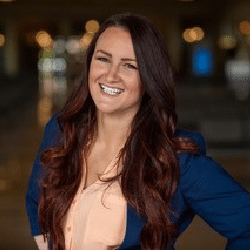
Violence in the Classroom: Negotiating Historical Narratives in Rwanda and Sierra Leone
In 1994, Rwanda experienced a genocide. During that time, Sierra Leone was in the midst of an 11-year civil war. Although the logic of violence in these conflicts differed greatly, in both cases, civilians were mobilized to perpetrate violence against their neighbors, and civilians were targets of violence. Twenty years after these violent conflicts concluded, institutions in both countries grapple with whether and how to teach their sensitive histories to the next generation.
During my fellowship year, I will analyze the interviews I conducted with educators and parents as well as my observations from history and social studies classrooms in both countries. I do so to understand how nationally created historical narratives are adapted, translated, and taught in the wake of mass violence in Rwanda and Sierra Leone.
Previous literature has shown education has the potential to promote future violence in post-conflict situations. Therefore, what children are taught about violence has implications for a country’s future stability. This project will contribute to the existing literature by examining how individuals, as part of broader educational systems, negotiate national narratives with their own experiences of violence in their efforts to educate younger generations. This allows for the further exploration of education, more specifically classrooms, not only as a site of memory dissemination but also a place where memory is constructed and perhaps even contested.
Judith Landeros, University of Texas
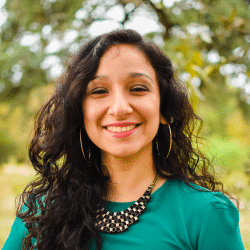
Judith Landeros is a doctoral candidate in the Cultural Studies in Education program at the University of Texas at Austin in the Department of Curriculum and Instruction. Her research interests are at the intersection of girlhood, traditional healing knowledges, and reproductive health education. Her dissertation is an ethnographic and decolonizing archival project grounded in an Indigenous and decolonizing lens in education. Through an intergenerational collaborative project, she focuses on the coming of age experiences of Indigenous and Indigenous Latinx girls in diaspora and (re)membering women’s erased epistemologies about reproductive health, menstruation, and sexuality. Judith is a former bilingual early childhood teacher in Chicago Public Schools. She earned her M.S.Ed. from Dominican University and her B.S. in Social Policy and Latinx Studies from Northwestern University where she received the Mellon Mays Undergraduate Fellowship.
Towards a Cuerpo-Territorio Sex Education: Indigenous Latinx Girlhood in Diaspora and Intergenerational Coming of Age Stories
What do we know about girls’ coming of age experiences in public schools in relation to the body, sexuality, reproductive health, and menstruation? Research about Indigenous and Latinx girls and their sexuality and reproductive health has been constructed around teen-pregnancy prevention and shame, hyper-sexualization, good/bad girl dichotomy, and disciplining the body through clothing, food, and hygiene. I focus on the experiences of menstruating bodies in-school and out-of-school contexts, specifically Latinx and Indigenous girls and gender expansive youth that is grounded through an Indigenous and decolonizing education lens. Reshaping the historical narratives about Indigenous women’s bodies, sexuality, and menstrual practices is deeply interconnected with interrogating racial projects of Latinidad, Mestizaje, the Casta System, land dispossession and displacement, and the material and discursive implications it plays in Indigenous livelihoods in diaspora and in the everyday experiences of Indigenous girls. I draw from Critical Latinx Indigeneities and Red Medicine frameworks and engage in intergenerational community-based research in Central Texas and ask: What are the intergenerational (children, youth, elder) coming of age (menstruation) stories of Indigenous Latinx girls in diaspora? This collaborative research project is organized to address three key areas: (1) Indigenous Latinx Girlhood & Coming of Age; (2) Curriculum of the Cuerpo-Territorio analysis with a focus on sexuality, reproductive justice, and menstruation education; and (3) Archival and Oral History/Narrative Analysis from a Curandera historian approach.
Talia Leibovitz, University of California, Berkeley
Talia Leibovitz is a doctoral candidate in the Berkeley School of Education at the University of California, Berkeley. Her research agenda explores how white and/or privileged parents’ conceptualize notions of educational equity and how these conceptions inform their school choice and community organizing efforts to sustain and/or interrupt racialized inequities in schools. Her dissertation utilizes theories of learning to understand the tensions and contradictions in white and/or privileged parents’ ability to organize towards racial integration and (dis)engage in racial discourse within the current sociopolitical context. Specifically, Talia’s dissertation is a three-year qualitative case study using critical ethnographic methods to examine a group of white and/or privileged parents organizing for school desegregation in Oakland Unified School District (OUSD), California. Talia received a M.A. in Education from UC Berkeley and a B.A in both Political Science and Communications from San Diego State University. While at UC Berkeley, Talia has taught graduate and undergraduate students in the Critical Studies in Education course. Prior to her graduate studies, she worked as a researcher for UC San Francisco and supported families with children with developmental disabilities at the Autism Center of Northern California.
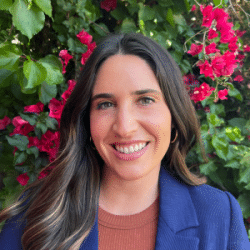
Co-Construction of Power, School Choice, and Desegregation: A Multi-level Analysis of a White and/or Privileged Parent Led School Desegregation Effort
At the 65th anniversary of the Brown v. Board of Education (1954) decision, scholars bemoaned that there has been no meaningful federal government effort devoted to voluntary integration of the schools, and it has been decades since federal agencies funded research about effective strategies for school integration (UCLA Civil Rights Project, 2019). The abdication of responsibility from the Supreme Court and the federal and state governments generated the need for individuals and communities to organize for school desegregation. The emphasis on remedying educational inequity through local level organizing, in combination with the recent “racial awakening” among white liberals, has resulted in white parents grappling with the consequences of their school choices, their egalitarian beliefs, and desire for an anti-racist identity.
As an interdisciplinary education policy scholar interested in the politics of school desegregation, I utilize theories of learning to understand white and/or privileged parents’ sensemaking of race, racism, and the social construction of “good schools”, and investigate how these parents organize for school desegregation. This study illuminates how and why white and/or privileged families engage in school desegregation efforts and identifies the political implications of their organizing. I do so through a three-year qualitative case study using critical ethnographic methods to examine a group of white and/or privileged parents organically organizing for school desegregation in Oakland, California. I consider the current sociopolitical landscape and utilize analytical tools from the learning sciences and social psychology to capture the contradictions, tensions, and organic nature of the participants’ school desegregation organizing across the individual, interactional, organizational, and structural levels. Preliminary findings demonstrate how the neoliberal local political economy, pro-privatization parent projects within Oakland, and ideologies of school choice inform the parents’ organizing and illustrate how parents often work in tension with one another and their ideals for a democratic vision of education. This study expands and complicates understandings of white and/or privileged parents’ organizing for school desegregation by paying attention to how the sociopolitical context, structural ideologies, and individual and collective work of parents simultaneously inform one another and ultimately impact and constrain their efforts.
Paula Mantilla Blanco, Teachers College, Columbia University
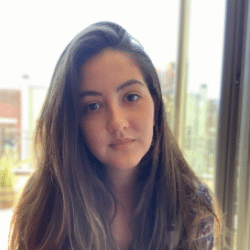
Paula Mantilla-Blanco is a Ph.D. candidate in Comparative and International Education at Teachers College, Columbia University. Her research interests include education in conflict and post-conflict contexts, the construction and transmission of memories of violence and resistance, and the role of education in transitional justice processes. Her dissertation focuses on the pedagogical use of memory sites in Colombia. Paula holds an M.A. in Cultural and Educational Policy Studies from Loyola University Chicago and a B.S. in Mathematics from the Universidad de los Andes in Colombia. She received the 2021-2022 USIP Peace Scholar Fellowship to support her dissertation fieldwork. Her pre-dissertation research was funded by the Institute of Latin American Studies and the Advanced Consortium on Cooperation, Conflict, and Complexity at Columbia University.
Education through Memory Sites: Youth and the (Im)Possibility of Peace in Colombia
Education is widely recognized as a fundamental mechanism for peacebuilding in contexts of transition, as it is expected to fulfil the dual goals of addressing the past and promoting a peaceful future. However, research in these contexts overwhelmingly conflates education with formal schooling and overlooks other pedagogical spaces. Memory sites, such as museums and memorials, are unique examples of non-formal spaces of education where memory is intentionally constructed and transmitted.
To understand the pedagogical use of these spaces, my dissertation explores the role of state-sponsored memory sites in educating for peacebuilding in Colombia. In the context of school visits, memory sites are used as pedagogical tools in connection to the formal education system. Emphasizing the intersection of formal and non-formal education, this project contributes to a broader view of education for peacebuilding. I build on sociological approaches to memory-building and the role of the state to better understand how youth interpret memory pedagogies and how processes of memory-building shape youth’s expectations about peace.
Through a mixed-methods, multiple-case study of two memory sites in Colombia, I analyze how memories are institutionalized and used for pedagogical purposes. I draw on the case of Colombia, where six decades of continuous conflict and three decades of piecemeal peace negotiations have led to the normalization of violence and the perception that peace is utopic. Empirically examining the connections between past and future and between individuals and collectives has the potential to unveil relevant challenges that arise as youth situate themselves as social and historical subjects.
Jessica Marshall, Northwestern University
Jessica is a Ph.D. student in the Learning Sciences at Northwestern University. Her scholarship and work with educators focuses on developing meaningful civic and political learning experiences that take seriously the identities, lived experiences and dreams of young people, particularly those from marginalized communities. As a pre-doctoral fellow with the Collaborative for Academic Social and Emotional Learning (CASEL), Jessica launched a research practice partnership with the Chicago Public Schools (CPS) where she led participatory design and analysis workshops with survivors, community partners, and classroom educators to inform the district’s revision of the Reparations Won Curriculum and aligned professional learning for educators.
Prior to her doctoral studies, Jessica was a special education and social studies teacher in both Chicago and New York City public school systems. She served as the founding director of the CPS Department of Social Science and Civic Engagement where she led strategic initiatives to implement districtwide civic and financial education, expanded student voice structures, developed multiple curricula in partnership with educators and community, and worked with scholars to develop infrastructure for research in civics and social studies education. Jessica earned a B.A. in Sociology modified with Latin American and Caribbean Studies from Dartmouth College and an M.S. in Special Education from City College – City University of New York (CUNY). She lives on the south side of Chicago with her wife, three awesome children, and their dog Pepper.
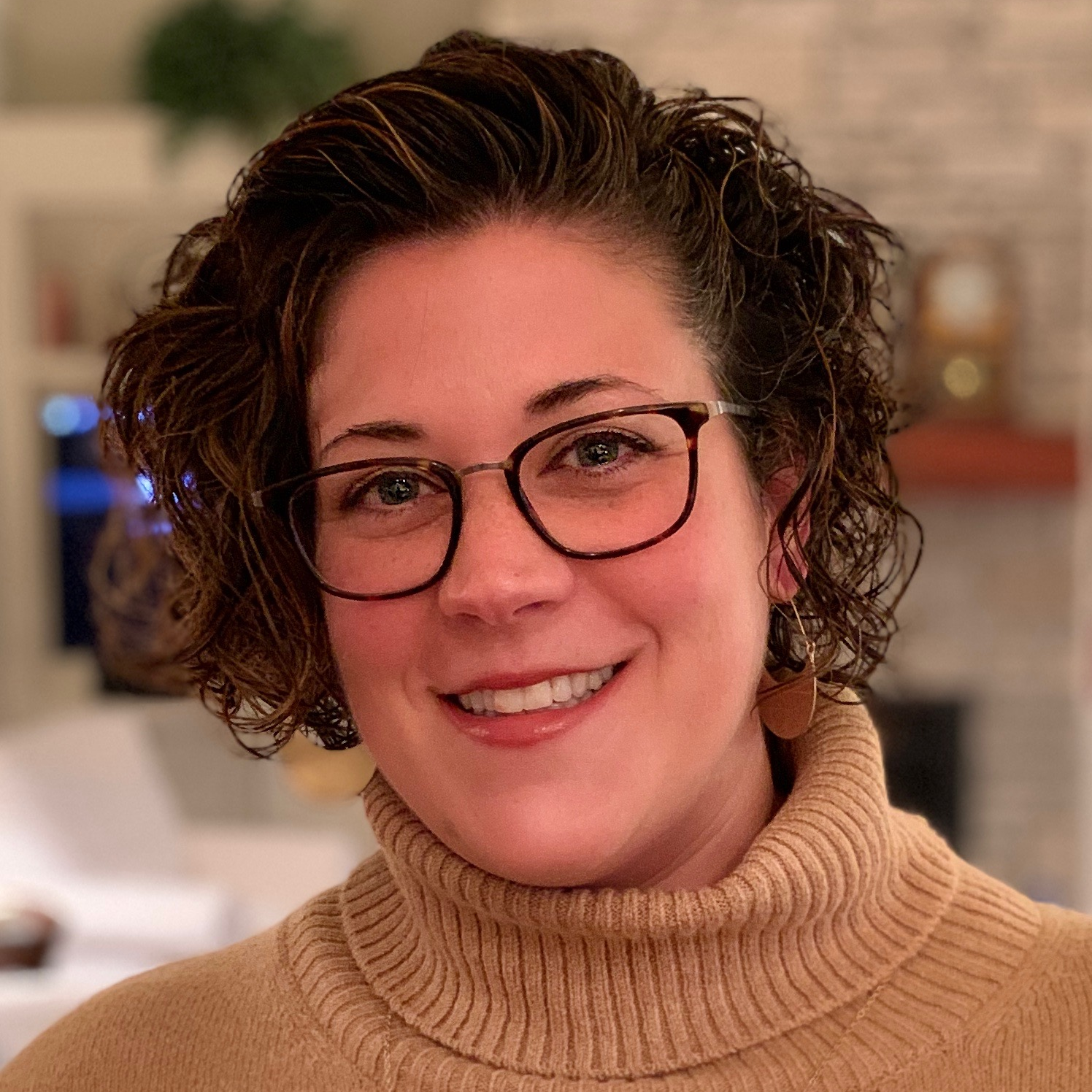
Teaching Reparations: Teacher Perspectives on Implementation of Mandated Curriculum on Racism and Police Violence
As debates rage about the role of schools in grappling with the legacies of racism in the US, most research and policy advocacy has focused on what is in the curriculum. Yet we know little about what happens when these curricula become district requirements. What do these policies mean for the teachers and students whose diverse identities and perspectives shape teaching and learning? My dissertation provides an in-depth case study of a mandated curriculum designed to engage students in local history of racism, police torture and the struggle for justice. Through in-depth interviews with 40 diverse teachers who have implemented the Chicago Public Schools’ Reparations Won Curriculum (RWC), I explore how this cohort of teachers conceptualized the learning goals of the RWC and how teachers’ approaches to curriculum implementation were mediated by their perceptions of students’ identities and histories, as well as their own. I contextualize teachers’ meaning making about the sociopolitical context through use of RWC curricular materials, contemporaneous media coverage and public documents about its development, and my own experiences as a district leader and co-designer of RWC. The layered and complex reflections of teachers who have implemented such a curriculum can reveal how teachers make sense of and enact curricula, where additional supports are needed, and where teachers’ innovations can advance our theories of learning. Absent a more nuanced view, we run the risk of one-size-fits-all professional development and the creation of curricular materials that are insufficient to support young people’s engagement in these important histories.
William Angus McLeod IV, University of Pennsylvania
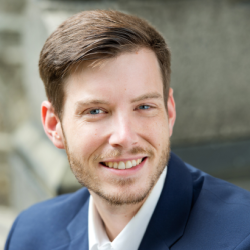
Angus McLeod is a joint doctoral candidate in Education and History at the University of Pennsylvania. He is concurrently serving as the Louis Galambos National Fellow at the Hagley Museum and Library and he served as the inaugural Berkowitz Fellow at Penn GSE in 2021-2022. His research, inspired by his own experiences moving schools as a child, attempts to explain the structural inequalities across U.S. public school systems.
In college Angus served as the TA for a course about education reform that also included a mentoring program for socioeconomically disadvantaged middle school students. He refocused the course to explore the mutually reinforcing links between property wealth, per-student spending, and school quality.
After college Angus joined Teach For America and taught high school social studies in South Texas. He cares deeply about the craft of teaching and, upon arriving at Penn, he gained a teaching certificate from Penn’s Center for Teaching and Learning. In 2019 he participated in the National Humanities Center’s Graduate Student Summer Residency.
Angus’ research is focused on the history of school finance and its inherent inequities. He explains the developmental trajectory that brought us to the present, and, more importantly, how to put us on a different path: one that results in greater equity and excellent schooling for all.
Unequal by Design: School Finance and State Development in Texas, 1821-2016
My dissertation uses a case study of Texas’ school finance system to highlight how the United States’ complicated system of school finance developed over time. I employ an historical approach to school finance to detail change over time and illuminate the people and institutions that made the system what it is. Taking a long view of Texas from the 1820s to the present, I capture the ways in which Texas is representative of broader state-level school finance issues. Whether it is legacies of segregation and discrimination, rural depopulation and growing cities, or rapid demographic change and low-tax conservatism, Texas history contains important moments that reveal the nuances of school finance development across the nation. Evidence for my dissertation comes from archival sources and newspapers, as well as oral interviews of activists and lawyers from recent judicial battles over school finance equity in Texas.
Public schools reveal the development of American state power better than historians and social scientists have realized because public schooling has long been a major component of state and local government capacities. My dissertation centers local and state public school financing to illustrate broad developments in state power and democratic decision-making in the nineteenth- and twentieth-century United States. School fiscal policy is the foundation upon which all of education is built, and powerful actors have structured school finance to reinforce their political and economic advantages. My project explains how that process unfolded and how activists for a more equitable system contested every step.
Jazmen Moore, University of Washington
Jazmen Moore is a Black girl from the Midwest, a grandchild of the Great Migration, and an educator raised on Anishinaabe homelands in Lansing, Michigan. She is also a doctoral candidate in the Culturally Sustaining Education program in the College of Education at the University of Washington. Her research focuses on Black girl refusals, consent-based learning, and chosen learning spaces. Her dissertation study draws from the field of Black studies, Black and Indigenous theories of consent and refusal, arts-based research design, and literacies studies within education.
Before the University of Washington, Jazmen taught high school English in and around Chicago and coordinated a youth-based spoken word club. She now collaborates with Seattle-based organizations and educators as a teaching artist and has facilitated poetry workshops with elementary through undergraduate classes, as well as intergenerational community groups. She holds a B.A. in English and a B.A. in Women’s and Gender Studies from Michigan State University and a M.A. in Teaching from Dominican University.
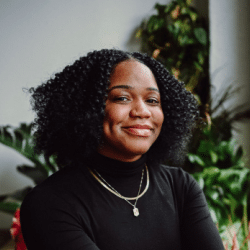
Black Girl Refusals, Consent, and the Possibilities of Chosen Spaces
Building with the work of Black Girlhood Studies, my dissertation research explores how the refusals Black girls make disrupt the ways they are framed as illegible (i.e., invisible, invalid, and dehumanized) in the context of U.S. schools and society. Refusals are a method Black girls use to navigate compulsory school learning environments that frame them as always and already deficient. This study highlights how Black girls render themselves and each other legible (i.e., seen, valid, and humanized) through their agentic refusals that occur when they participate in chosen, consent-based learning spaces. Through a three-tiered, multigenerational approach, this qualitative study centers the lives of three groups of Black girls and women while examining the roles consent and refusal have played throughout their learning experiences.
Study participants/co-researchers engage in arts-based research methods through interviews and small group dialogues while also co-creating a chosen learning space (CLS) to reflect on their educational journeys and to imagine more justice-based learning experiences for Black girls.
Through the co-construction of their CLS, the girls and women in this study model how consent- based learning practices position them to imagine and create (poetry, self-portraits, multi-media pieces, organizing practices, etc.) beyond anti-blackness and cis-heteropatriarchy. In turn, this study deepens understandings of the intergenerational navigational practices of Black girls and discusses nuanced ways meaning is made by Black girls and women in CLSs.
Emily Norweg, Georgetown University
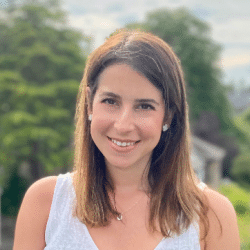
Emily Norweg is a doctoral candidate in the Georgetown University Department of History. Her work centers on the link between mass incarceration and educational inequities in the US, with a particular focus on the history of higher education in prison. Outside of her own research, Emily has assisted with projects for Ithaka S+R, the Smithsonian Institution Archives, Alexis Coe, and Marcia Chatelain, including Chatelain’s Pulitzer Prize-winning book Franchise: The Golden Arches in Black America (Liveright/Norton, 2020). An experienced educator with an M.Ed. from Boston College, Emily has had the privilege of teaching high school students at a public school in Massachusetts and college students at the Central Detention Facility in Washington, D.C.
Mass(achusetts) Incarceration and Higher Education: The History and Politics of College Behind Bars in the Commonwealth
My dissertation explores the history of higher education in Massachusetts prisons in the broader context of the American carceral state. Educators, politicians, advocacy groups, and students themselves pioneered access to college coursework for incarcerated students in Massachusetts. Their work established some of the longest-running and most successful college-in-prison programs in the country, building on the potential of higher education to disrupt trends in mass incarceration, particularly along racial and economic lines. Long positioned as a bastion of liberal ideas and educational excellence, Massachusetts provides a unique lens through which to view the history of college-in-prison. Building on work other scholars have offered regarding the disconnect between the Commonwealth’s reputation and the ways that predominately white residents have responded to more progressive legislation, this dissertation explains how college-in-prison was situated in the middle of a political frenzy centered on race, education, and corrections. From the Boston busing crisis in the 1970s to the prison furlough program controversy of the 1980s, Massachusetts stood at the crossroads of liberal policy and virulent public opposition. As a tough-on-crime agenda swept the nation in the 1990s, the impact of the sweeping 1994 Violent Crime Control and Law Enforcement Act seemed to doom college-in-prison programs. In Massachusetts, at least one managed to survive. Weaving together a blend of media sources, documents from state archives, and personal narratives from educators, students, and college-in-prison program leaders, this dissertation documents the long and tempestuous struggle to bring higher education to incarcerated students in the Commonwealth of Massachusetts.
Susha Roy, Harvard University
Susha Roy is a Ph.D. candidate in Education Policy and Program Evaluation at Harvard University. Her research explores how social stratification manifests and persists through the education system and what specific education policies can help mitigate social and economic inequalities. Susha aims to produce research that marries policy-relevant needs with theoretically compelling questions that rigorous, quantitative analysis can help answer. In her dissertation, she focuses on the impacts of school choice programs on stratification and inequality.
Prior to her doctoral studies, Susha worked at an education technology company that helped high schools launch computer science programs. She received a B.A. in Public Policy from Stanford University and an M.A. in the Economics of Education from Columbia University, Teachers College. Susha is also an illustrator. Bridging her passion for research and art, her recent artwork features educational depictions of quantitative methods. Susha was raised in Sydney, Australia.

Effects of Public School Choice on Neighborhood Inequality: Evidence from Los Angeles
For decades, school attendance zones have defined neighborhoods: families sort into specific areas to gain access to desired schools. This sorting contributes to residential segregation and socioeconomic stratification. But, as public school choice becomes an increasingly common feature of urban school reform, the tight link between neighborhoods and schools is becoming weaker. Public school choice policies may fundamentally change how families sort into neighborhoods. This has implications for the resulting composition of neighborhoods. My research addresses how public school choice policies shape neighborhoods. I study a public school choice program in Los Angeles that created specific geographic areas within the school district—Zones of Choice (ZOCs)—comprised of multiple high school options. For students living in ZOCs, high school assignment is based on ranked preferences of schools within the zone; for students living outside of ZOCs, high school assignment is determined by residential address. Therefore, the ZOC boundaries delineate areas in which school choice is or is not a required feature of accessing public high schools. I use the introduction of these boundaries, and the variation in exposure to public school choice that they mandate, to assess how families respond to public school choice in their residential decisions. While existing research evaluates the impact of school choice on student achievement, I contribute novel evidence about whether this increasingly common place-based education policy has beneficial side effects on neighborhood-level outcomes. I focus on racial and income segregation because these neighborhood factors are related to human capital development and upward mobility.
Harshil Sahai, University of Chicago
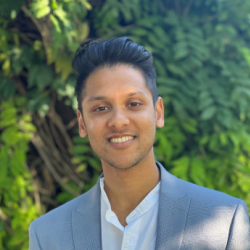
Harshil Sahai is a Ph.D. candidate in Economics at the University of Chicago. His research is focused on development economics, with an emphasis on education and labor markets. By building partnerships with public and private organizations, he leverages new sources of data, field experiments, and economic models to study policy questions in developing countries.
In his dissertation, Harshil is working with government agencies in India to quantify the welfare impacts of the largest private school voucher system in the world targeted to disadvantaged households. He is also partnering with Facebook to study the role of social networks in driving migration decisions in India, and what this may mean for the economic value of social capital. In other work, he has designed randomized control trials to estimate the demand for clean air among low-income populations of New Delhi and the value of monsoon forecasts as a tool for climate change adaptation among Indian farmers.
His research has been funded by the National Science Foundation Graduate Research Fellowship, the Becker Friedman Institute, and the Abdul Latif Jameel Poverty Action Lab. Before his graduate work, Harshil was a Pre-Doctoral Fellow with Michael Greenstone at the Energy Policy Institute of Chicago and completed his B.A. in Mathematics and Economics from Swarthmore College.
The Welfare Implications of Private School Vouchers: Evidence from India
In 2009, India launched what is now the largest private school voucher system in the world targeted to disadvantaged households. Policy of this scale may affect academic and financial outcomes across both recipients and non-recipients. This paper uses detailed administrative records to study the welfare consequences of this voucher policy, accounting for the multiple dimensions of school preferences as well as how schools may respond in equilibrium. Estimates from oversubscription lotteries suggest vouchers deliver modest gains to learning outcomes, with many applicants attending private schools counterfactually. Combining rich choice data from applications together with lottery price variation, a model of school choice suggests money-metric welfare gains are large relative to program costs for recipients, driven both by academic improvements in school quality and financial savings from avoided school fees. Administrative data from schools together with a model of strategic pricing suggests private schools may raise prices in response to the policy, resulting in welfare losses for non-recipients.
Consuelo Sánchez-Bautista, University of Minnesota
Consuelo is a doctoral candidate in the Comparative International Development Education program at the University of Minnesota, Twin Cities, and a former Fulbright – Colciencias Fellow. Her scholarship examines the complex relationships between education and migration, particularly in contexts affected by armed conflict, violence, and forced displacement in Latin America. Consuelo has been involved in peacebuilding and peace education projects in some of the regions most affected by the armed conflict in Colombia and has researched forcibly displaced children and youth access to education in Ecuador. Her research has drawn on qualitative methods to explore issues concerning public policies and practices related to migrants’ and refugees’ access to rights and social inclusion in origin and destination countries. She holds master’s degrees in Spanish Linguistics, Spanish Philology, and Sociology and has broad experience working with public, private, and multilateral development organizations. Through her research and teaching, she has always sought to strengthen the links between scholarship and public policy with the aim of informing decision-making processes for children and youth affected by conflict and displacement.
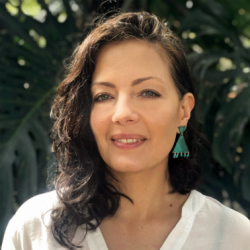
Flexible Education for Overaged Youth on the Move: Policy Discourses and Appropriation Practices in Urban Public Schools in Colombia
Armed conflict not only limits education opportunities for youth on the move—or youth moving across a territory for various reasons, such as conflict, violence, poverty, and famine—but also creates a problem when they seek to return to classes designed for younger students. Global education policies, such as flexible education, aim to remedy this situation and improve access to education for out-of-school and overaged populations. The bourgeoning literature on flexible education has reported that although this approach to education has increased both access to education and learners’ academic performance, dropout rates from these programs remain stubbornly high. This paradoxical situation of youth on the move leaving flexible education programs designed to be adapted to their needs is the puzzle that lies at the center of my inquiry. Most of the research in the field of education in conflict-affected zones has pointed to individual and family characteristics to explain dropout rates. In contrast, my research explores how policy design and implementation practices influence and shape the opportunities for overaged youth on the move to (re)enroll in formal education and continue studying until they eventually graduate from high school.
To understand policy formation and appropriation processes that can address complex problems of mobility and education, my project is a qualitative comparative case study that examines a flexible education policy at national and local scales in Colombia. This study incorporates a mobility and diversity perspective to provide theoretical and practical insights on how to address the educational needs of a diverse population in terms of age, gender, ethnicity, mobility backgrounds, and livelihood needs. In this process, this research puts into debate the adaptation of the stationary institution of schooling to the realities of diversity, mobility, and uncertainty to prevent dropout rates.
David E. K. Smith, University of Pittsburgh

David E. K. Smith is a Ph.D. candidate in the Department of Educational Foundations, Organization, and Policy at the University of Pittsburgh. His research interests are broadly focused on how the arts can provide transformational educational tools that could be better integrated into both formal and informal schooling, especially among Indigenous populations. His dissertation is an extensive ethnography of two Iñupiaq dance and drumming groups exploring participation of other-than-human members and highlighting potential insights for building more culturally relevant learning experiences. David’s previous projects include an investigation of the use of flamenco music for community building among Muslim immigrants and refugees in southern Spain as a Foreign Language and Area Studies Fellow, and the use of popular music for language revitalization in Germany, Mexico, and Australia.
An avid musician, composer, and educator, David has taught, written, and performed in Nepal, Uganda, Spain, New Zealand, and Alaska. He holds a M.A. in International Education Management from the Middlebury Institute of International Studies and a B.A. in Music Composition from Bates College.
Ecosystems of Teaching and Learning: An Ethnography of Two Iñupiaq Dance Groups
There is a jarring dissonance between Alaskan educational policy and Alaska Native ways of teaching and learning, a divide especially visible in how cultures interact with nature. As policymakers reconcile the colonial history of education in Alaska, they should look to how education has always happened among Alaska Native people. One foundational Native educational practice is dance. My dissertation is an ethnography of two Iñupiaq Alaska Native dance and drumming groups, drawing from decolonial participatory action research and extensive interviews of Iñupiaq elders, educators, and youth. These groups are what Wenger (2002) describes as communities of practice; groups that learn situated within a shared interest. Exploring how teaching and learning happens in Indigenous arts-based communities of practice, I (1) reconceptualize Wenger’s community of practice to allow for Iñupiaq understandings of animals and the land as integral interlocutors in the learning process, creating what I term an ecosystem of practice; (2) outline what is taught and learned including moral, social, and skill-based critical cultural knowledge; and (3) investigate potential educational outcomes including youth empowerment, cultural transmission, and addressing pressing current issues. As an expansion into the growing field of arts-based culturally responsive pedagogy, this research has important implications for educational policy across cultures and borders, through better understanding the transmission of Indigenous knowledge and elucidating the relationship between education, humanity, and nature.
Jessica Lee Stovall, Stanford University
Jessica Lee Stovall is a doctoral candidate in the Race, Inequality, and Language in Education (RILE) and Curriculum and Teacher Education (CTE) programs at Stanford’s Graduate School of Education. Her work in education draws on Black Studies to explore how Black teachers create fugitive spaces to navigate and combat antiblackness at their respective school sites.
Jessica’s research has been supported by the Fulbright Distinguished Award in Teaching grant, the Stanford Enhancing Diversity in Graduate Education (EDGE) Fellowship, and the Ford Foundation Predoctoral Fellowship. In addition to the NAEd/Spencer Dissertation Fellowship, her dissertation research has been supported by the Stanford GSE Dissertation Support Grant and the Stanford Diversity Dissertation Research Opportunity. She holds a B.S. in Secondary Education from the University of Wisconsin-Madison and a M.S. in Literature from Northwestern University. Before beginning her doctoral studies at Stanford, Jessica taught English and Reading for 11 years in the Chicagoland area.
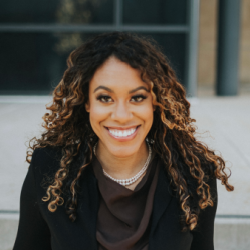
“It’s Just Our Brilliance, Uncut and Raw”: The Transformative Power of a Black Teacher Fugitive Space
Growing concerns about antiblackness in education and the related attrition of Black teachers highlight the need for research on professional development spaces that support Black teacher retention. Drawing on ross’s (2021) notion of educational fugitive space, my dissertation research is a longitudinal examination of how Black teachers co-create a Black teacher fugitive space, and how this space informs and supports their pedagogies and navigation of antiblackness at their school sites. Fugitivity is what Ford (2014) called the “artful escape of objectification” (p. 4), and it connotes an enslaved person who runs away from anti-Black horrors toward a freedom dream. My research employs these notions of educational fugitivity from Black Studies to theorize how these Black-affirming places are rehumanizing and sustaining for Black teachers, offering implications for Black teacher retention.
Through ethnographic interviews of elder teachers who taught during the integration efforts of the 1960s along with today’s teachers, this research first sets the landscape of both the historical and contemporary climate for Black teachers in the Bay Area. Then, I used participant observation methods to follow 20 Black teachers for a year in the Black Teacher Project (BTP), a professional development racial affinity space that I theorize is a fugitive space. In a subsequent year, I followed a subset of Black teachers from the BTP into their classrooms to study how this fugitive space impacts their pedagogies and their students’ response to them. This project thus extends research on Black teacher retention by focusing on how Black-affirming fugitive spaces can support teachers in collectively reimagining schools as sites of liberated learning for their students.
Ankhi Thakurta, University of Pennsylvania
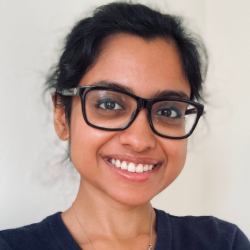
Ankhi G. Thakurta is a Ph.D. candidate in the Reading/Writing/Literacy program at the University of Pennsylvania Graduate School of Education. Informed by her own experiences as an Indian American, her transnational research draws on critical literacy scholarship, theories of transnational girlhoods, and critical urban studies to explore the civic identities, meaning-making (literacies), and learning of urban migrant girls. Her aim is to expand our understanding of these youth as already significant civic actors, and to shape the creation of participatory civic education programs that nourish their vast potential in and across their home cities.
Ankhi has held various roles in the education field. After college, she supported undergraduate writers as a Global Academic Fellow in the United Arab Emirates at New York University in Abu Dhabi. Next, she taught eighth grade English Language Arts at a New York City public school. At Penn, she has managed Dr. Gerald Campano and Dr. María Paula Ghiso’s Philadelphia-based research practice partnership which is dedicated to exploring issues of educational equity and access alongside culturally and linguistically diverse communities in the city. Her work has been published in various journals including the Journal of Adolescent and Adult Literacy and Urban Education. She is also a visual artist who is interested in how arts-based methods can be utilized in processes of data collection and analysis.
Ankhi holds a B.A. from Swarthmore College, an Ed.M. from the Harvard Graduate School of Education, and an M.A. from Brooklyn College.
Landscapes of (Im)possibility: A Comparative Case Study of the Civic Identities, Literacies, and Learning of U.S. and Indian Urban Migrant Girls
In cities across the U.S. and India, the world’s two largest democracies, girls from migrant communities face comparably converging barriers to civic inclusion. These include sociocultural factors, urban inequalities (e.g., housing precarities), and gendered hierarchies. Concomitantly, these youth are also drawing on their meaning-making repertoires to negotiate local constraints through processes like digital engagement. Thus, they are also asserting emergent civic identities.
In and beyond education, prior research has found that critical, literacy-based civic education programs can promote the sociopolitical belonging of U.S. and Indian urban migrant youth. However, scholarship has mostly analyzed nation-specific programs centering these young people as wider demographic groups. We consequently know little about how urban migrant girls in and across these two major democracies engage with critical civic learning. Comparative research into this area is necessary to develop transnational civic education programs that are informed by the place-specific, yet similarly intersectional challenges these uniquely situated actors face.
This Comparative Case Study addresses this gap by foregrounding urban migrant girls from two prominent U.S. and Indian cities who participate in two virtual civic education communities. It uses interviews, document analysis, and practitioner methods to comparatively explore how youth already view and enact civic identities, and how they engage with critical civic education. Besides generating comparative knowledge about U.S. and Indian urban migrant civic girlhoods, this research will lay foundations for trans-urban education programs that prioritize the civic flourishing of migrant girls from the city scale.
J. Eos Trinidad, University of Chicago
J. Eos Trinidad is pursuing a joint Ph.D. in Sociology and Comparative Human Development at the University of Chicago. Bringing together organizational and education sociology, his research investigates the spread of school innovation through networked organizations outside the school system. Over the past five years, he has published 28 peer-reviewed journal articles and two books, one of which won the Philippine National Book Award. His research has three strands: (1) quantitative studies on educational programs and policies that have been published in International Studies in Sociology of Education, Studies in Educational Evaluation, and Social Psychology of Education; (2) qualitative studies on organizational change and leadership in higher education published in Journal of Further and Higher Education, College Teaching, and Industry and Higher Education; and (3) causal inference studies regarding youths using quasi-experimental methods published in Social Science and Medicine, Journal of Pediatrics, and Race Ethnicity and Education.
His research has been supported by the National Academy of Education/ Spencer Foundation, American Sociological Association/ National Science Foundation, Asian Development Bank, RAND Corporation, and the Mansueto Institute for Urban Innovation. Eos has taught classes on research methods, education innovations, and human development. He has also served as peer reviewer in various education, sociology, and quantitative social science journals. He received his B.A. summa cum laude from the Ateneo de Manila University, and his M.A. from the University of Chicago, winning the Johnson Prize for his graduate thesis.
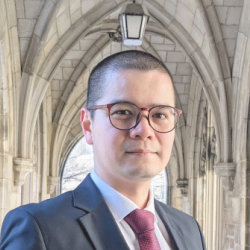
Webs of Improvement: Data, Organizations, and the Spread of School Innovation
When many urban school reforms fail and falter, why do some succeed and spread? Often, studies explain this through top-down state capacity or grassroots mobilization. But many evidence-based policies and enthusiastic individuals often fail to spread their initiatives. Thus, this research explores how “outside” organizations—that is, the network of research, philanthropic, and school improvement organizations—were crucial in spreading school innovation. Using the case of ninth-grade early warning indicators (EWIs) and data systems that have been adopted in many schools and districts in the United States, this research uncovers how webs of meaning, organizations, and practices contributed to the initiation and institutionalization of this practice. Situated in Chicago, Philadelphia, and New York—cities that started EWIs at scale—this research brings together organizational documents, interviews, and social network data to suggest organized and organic strategies that led to the adoption of these predictive data systems that tried to address and prevent high school dropouts. Theoretically, the research contributes to the literature on new institutionalism by showing how organizational change is influenced by flexible rather than set logics, entrepreneurial interactions rather than individual entrepreneurs, and everyday organizational routines rather than abstract cultural changes. Practically, it suggests how various organizations outside schools can leverage data and state-society networks to initiate, implement, and institutionalize school innovation. More broadly, the research explores how educational change happens not primarily through policy changes or social movements, but through webs and networks of school improvement.
Brittany Vasquez, University of Michigan
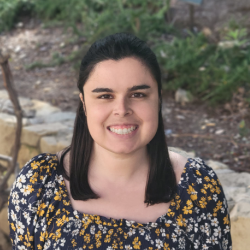
Brittany Vasquez is a Ph.D. Candidate in Public Policy and Sociology at the University of Michigan. She is a Rackham Merit Fellow, an IES Fellow in Causal Inference in Education Policy Research, a predoctoral trainee with the Population Studies Center, and a Student Fellow with the Stone Center for Inequality Dynamics. Prior to her doctoral studies, Brittany received her B.A. in Sociology from Wake Forest University. Her initial interest in educational inequality began while tutoring in local elementary schools, but it was during an introductory course on education policy and an eventual minor in Education that she became determined to pursue a research career. Her experiences interning with the Minneapolis Foundation and the Z. Smith Reynolds Foundation, and later working in a Boston charter school enriched her perspective on educational issues.
While at Michigan, she has assisted and collaborated on several projects with the Education Policy Initiative. Most recently, she co-authored an NBER working paper on the crime-reducing effects of increased public school funding. In other work funded by UM’s Poverty Solutions, she is collaborating on an evaluation of the inclusion of Medicaid as a direct certification program for the National School Lunch Program. Her primary research interests center on educational inequality and the effects of state and federal policies, particularly as related to school finance. Brittany’s dissertation evaluates two interventions to deal with fiscal constraints in education: increased state oversight through fiscal accountability policies and increased autonomy through charter schools.
Does Oversight Matter? Understanding the Impact of Fiscal Accountability on District Finances and Student Achievement
The Great Recession illuminated a growing problem in public education: an increased number of school districts are experiencing financial troubles. Fiscal distress has forced some school districts to cut payroll, default on loans, and, in the most extreme cases, led them to seek bankruptcy or to dissolve. In response, since the early 1990s nearly all U.S. states have passed laws that permit increased oversight of and intervening power into district financial management aimed at counteracting distress. State interventions are a form of accountability, that is, fiscal accountability. The goal of accountability in education is to incentivize improvement on some metric through rewards and sanctions; fiscal accountability, more specifically, aims to increase transparency and to maintain the fiscal condition of school districts. Most research on accountability in education has focused on test-based accountability.
Evidence on the adequacy and effectiveness of fiscal accountability policies, in contrast, remains elusive. This is particularly problematic as the recent COVID-19 pandemic has brought new forms of budget strain as state revenue and enrollment declined, especially for districts serving larger proportions of racially marginalized students. My study addresses this critical knowledge gap by providing the first national causal estimate of fiscal accountability policies on school district finances, fiscal health, and student outcomes. An evaluation of fiscal accountability policies has previously been difficult due to data and methodological limitations. I use an original dataset containing the universe of laws authorizing state intervention for fiscal reasons, and leverage variation in the timing of adoption in an event-study framework.
